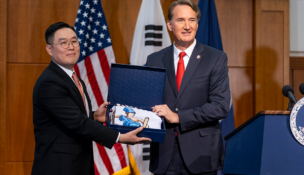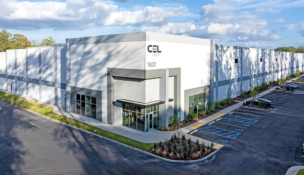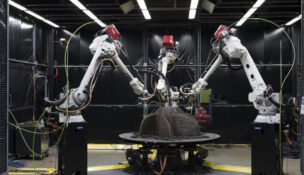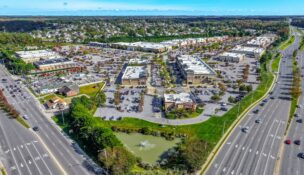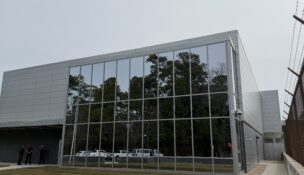Port of Virginia sees 8.7% drop in cargo traffic
Uncertainty surrounding tariff policies cited as main driver
Josh Janney //September 17, 2025//

Port of Virginia has seen a drop in shipping container volumes this year. Photo courtesy Port of Virginia

Port of Virginia has seen a drop in shipping container volumes this year. Photo courtesy Port of Virginia
Port of Virginia sees 8.7% drop in cargo traffic
Uncertainty surrounding tariff policies cited as main driver
Josh Janney //September 17, 2025//
SUMMARY:
- Port of Virginia‘s container volumes drop 8.76% year-over-year amid tariff uncertainty
- Consumers likely to feel impact as trade war lingers
- Despite declines, port continues with major upgrades
Amid President Donald Trump‘s trade war and shifting tariff policies, the Port of Virginia has seen a decline in shipping container volumes in recent months.
The president has imposed a slate of new tariffs this year on more than 90 countries and several categories of products, with some as high as 50%. Port of Virginia data shows that the port has moved 2.19 million 20-foot equivalent units (or TEUs) through August of this year, compared to 2.4 million at the same point last year — an 8.76% decrease in cargo. Export loads through August have dipped by 9.3%, whereas import loads have dipped 7.5%.
Port of Virginia spokesperson Joe Harris attributed the dip to the “overall trade environment,” which he expects to fluctuate until there’s a policy that “everybody understands and can put to work.”
There is a lot of uncertainty over changes in tariff policy and fluctuating prices, Harris added. “You know, it moves back and forth. … It makes it hard for cargo owners, and the ports are the ones that have to move the cargo. So, as soon as we have a more stable trade environment … I can’t say you’ll see volumes go up, but they’ll level off. But the trade environment is just difficult right now.”
Tariffs are the most likely cause of the drop in container volumes at the port, said Vinod Agarwal, an economist at Old Dominion University, adding that the Trump administration‘s frequent and unpredictable policy changes and uncertainty have made long-term planning difficult for shippers and businesses. While some companies in the country frontloaded their shipments to beat tariffs, Agarwal said, he hasn’t seen that happen to a noticeable effect at the Port of Virginia.
“Businesses do not like uncertainty,” he said. “They may not like the policies, but they can live with it if they know what in the world to expect.”
So far, consumers haven’t felt the full impact of tariffs due to businesses absorbing the cost or stockpiling goods before the tariffs went into effect. However, Agarwal warned, as the trade war continues and inventories deplete, price increases will eventually hit consumers more significantly.
“We don’t think we are taxing the consumer, but we actually are, indirectly, because consumers are going to pay for these goods in terms of higher prices,” Agarwal said. “Or, businesses have to absorb these costs.”
While reciprocal tariffs can be fair, he said, the Trump administration’s broad and politically driven tariffs are impacting stability.
Despite the challenging environment, the port is still moving forward with major improvement projects.
The port said this summer it was on track to complete its $450 million dredging project to become the deepest and widest harbor on the East Coast by the end of this year. The port also said the first phase of a $650 million modernization expansion of Norfolk International Terminal’s north terminal is expected to be completed in October.
g


